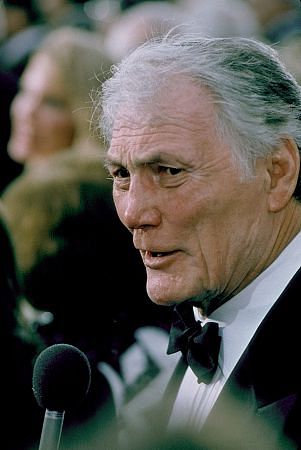|
Jack Palance
Scroll down for movie list.
Trivia
Former father-in-law of 'Roger Spottiswoode' Father-in-law of 'Michael Wilding Jr'.
American actor, with ukrainian origin.
Father of Brooke Palance
Father of Holly Palance.
Has never watched any of his own movies.
Underwent plastic surgery (a facial reconstruction) for severe injuries after his B-17 bomber crashed landed in England in 1943 during World War II.
He replaced Marlon Brando as Stanley Kowalski in the Broadway production of A Streetcar Named Desire
Biography from Leonard Maltin's Movie Encyclopedia:
After more than 40 years in pictures, Jack Palance finally won a Best Supporting Actor Oscar for City Slickers (1991), playing a tough, wheezy, old cowboy with rapidly hardening arteries. As he accepted his award, he felt compelled to demonstrate that his physical condition in the film had nothing to do with the actual state of his health, and he demonstrated his physical prowess by doing a set of one-arm push-ups. Palance's rugged face, which took many beatings in the boxing ring, was disfigured during World War 2. Plastic surgeons repaired the obvious damage but left him with a distinctive, somewhat menacing look. He became an actor after the war and had several stage roles before coming to the movies.
In his first film (billed as Walter Jack Palance), Elia Kazan's tingling Panic in the Streets (1950), the actor made a definite impression, as a plague-carrying fugitive hunted by military physician Richard Widmark. Following Halls of Montezuma (1950), he got to menace Joan Crawford in Sudden Fear (1952) and was nominated for a Best Supporting Actor Oscar. He received a second nomination for his unforgettable portrayal of a pathological gunfighter in Shane (1953), and won an Emmy for Best Actor as the prizefighter in "Requiem for a Heavyweight" on CBS' "Playhouse 90" (1956). His other films during this fertile period include The Silver Chalice (1954), The Big Knife, I Died a Thousand Times (both 1955), Attack! (1956, playing a "hero" of sorts), The Lonely Man (1957), and The Man Inside (1958).
Inexplicably, by the early 1960s, Palance was toiling in a seemingly endless string of marginal films, including Sword of the Conquerer, The Mongols (both 1961), and Warriors Five (1962). (A happy exception was 1963's Contempt for director Jean-Luc Godard.) In 1963-64 Palance played the part of Johnny Slate in the ABC series "The Greatest Show on Earth." The Professionals (1966) brought Palance back to the attention of American filmmakers; he landed a meaty role in The Desperados and played Fidel Castro in Che! (both 1969).
Palance was in demand during the last gasp of the Western through the early 1970s in pictures like The McMasters, Monte Walsh (both 1970), and Oklahoma Crude (1973), but he was again forced into the international arena to remain active, churning out an alarming number of foreign-language turkeys. Palance has also occasionally ventured into the realm of "art" movies with the dreadful Warhol factory tedium of Cocaine Cowboys (1979) and the German-made Bagdad Cafe (1988), in which he played a "dropout" artist living at a remote cafe in the American southwest. Batman (1989) brought him back to the Big Time with a vengeance, casting him as a sleazy crime king; then City Slickers offered him a role with humor and heart, a perfect invitation for Oscar voters to respond not only to a performance but to a career. More recently, he appeared in Solar Crisis (1992), Cops and Robbersons (1994, playing straight to Chevy Chase), and City Slickers2: The Legend of Curly's Gold (1994, as his deceased character's twin brother) and participated in a number of TV documentaries.
|  |










